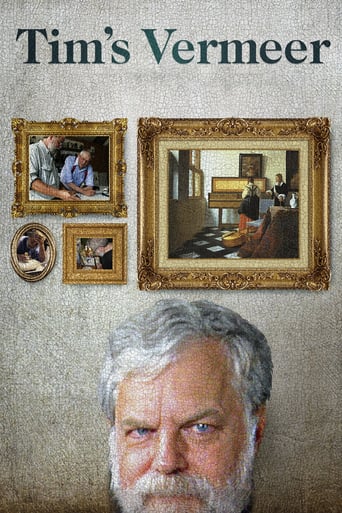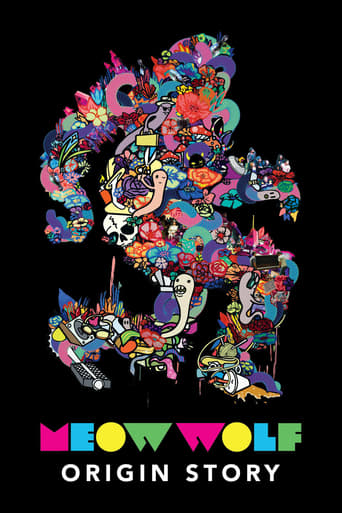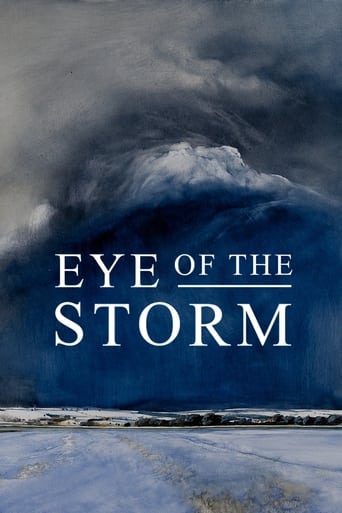


Tim's Vermeer
Tim Jenison, a Texas based inventor, attempts to solve one of the greatest mysteries in all art: How did Dutch Master Johannes Vermeer manage to paint so photo-realistically 150 years before the invention of photography? Spanning a decade, Jenison's adventure takes him to Holland, on a pilgrimage to the North coast of Yorkshire to meet artista David Hockney, and eventually even to Buckingham Palace. The epic research project Jenison embarques on is as extraordinary as what he discovers.
-
- Cast:
- Penn Jillette , Martin Mull , Teller , David Hockney , Colin Blakemore


Similar titles





Reviews
Captivating movie !
Awesome Movie
While it is a pity that the story wasn't told with more visual finesse, this is trivial compared to our real-world problems. It takes a good movie to put that into perspective.
It's easily one of the freshest, sharpest and most enjoyable films of this year.
I've watched this film many times because it is in itself a masterpiece. I'm a fan of Vermeer and this film attempts to divulge that it would be nearly impossible for any artist to create the works that Vermeer did without some kind of assistance.One aspect is that Vermeer did not sketch this work beneath the paint; something always found within other works by other renowned artists. As pointed out, microscopic tests suggest that Vermeer painted without having drawn anything on the canvas of this particular work, "Music Lesson".It is captivating to see how a modern day man can mix pigments to make paint as it was made in the 1600's, no less that he could re-create a masterpiece in modern times as exact as well. The attention to details by erecting a room that was so much like the original is simply amazing.This is a must see film for anyone who enjoys art and especially those of the great masters. It does question how great they really were, given that a priceless artwork can indeed be reproduced in what can only be called, "brilliant". However given that we can "copy" such works, they are still appreciated as masterpieces no matter how they were created. Does age alone make such works stunning or valuable? Perhaps yes. Were the artists that great? Perhaps no. Either way, this film is an incredible view from the perspective of the only man who has challenged what we thought we knew. It is up to the observer to decide the truths.
Tim Jenison works out how it was possible for Vermeer to paint what amounts to photo realistic paintings with a great deal of ease. He then builds a full scale room that matches one in a Vermeer painting in order to further prove it.I'm mixed on this film. While I think Tim pretty much proves Vermeer could have used this method to paint the film, I'm still pondering why the film runs 80 minutes especially after 15 he's proved his point. Yes I completely understand that seeing Tim paint the copy is the point but taking it that far raises more questions than are healthy such as how Tim learned to paint and mix colors and how it would be possible for a regular guy to just do it.Don't get me wrong but at a certain point I just wanted to know why this film was longer than say a half an hour.Worth a look but its little more than a Discovery Channel documentary.
What exactly is the relationship between science and art? Are they entirely separate domains or is there, Venn-diagram-like, some overlap between them?The 17th Century Dutch painter Johannes Vermeer has long been considered the world's master of the "photographic" painting. So lifelike, in fact, are Vermeer's works that it has long been speculated that he may have used some kind of scientific device available at the time to help him achieve the effect. Well, filmmaker Penn Jillette, with the help of Tim Jenson - an inventor, NOT a painter - has decided to get to the bottom of the controversy. The result is "Tim's Vermeer," a brief (76 minutes), fast-paced and utterly absorbing documentary that provides an aesthetic and intellectual feast for art and science lovers alike.Since this IS Penn Jillette we're talking about here - an illusionist who is also a tireless advocate for rationalism and empiricism - it's fitting that the movie would apply scientific precepts to its analysis of art. Tim hypothesizes that Vermeer may have used a device called a camera obscura combined with a small portable mirror to achieve an unprecedented verisimilitude in his paintings. It's pure speculation, since Vermeer left no notes behind documenting his creative and technical process. So Tim has decided to paint his own "Vermeer" using the technique he postulates the artist himself used, and to document that process on film. To that end, Tim has chosen Vermeer's "The Music Lesson" as his subject to copy, going so far as to recreate the room, along with the people and objects contained therein, of the original painting down to the smallest detail, only utilizing (and even crafting, if necessary) lenses, mirrors, lighting and paints that were in existence in the 1600s. It is a project that would take five full years to complete.If Vermeer did indeed use these optic "tricks" to achieve his effect, does that somehow diminish him as an artist? Does it make his skill as a painter less astonishing, even if it heightens his ingenuity as an inventor and problem-solver? Probably no more so than a second-rate painter being able to replicate (i.e., "forge") any art masterpiece diminishes the talent of the original artist. And why would it be considered "cheating" for an artist to incorporate all the technological devices available to him at the time to help him in his painting? Why must there exist an arbitrary and artificial dividing line between science and art? These are the questions that Teller's fascinating little movie brings to the fore.But isn't it better just to keep it all as a mystery, to declare Vermeer an artistic genius of the first rank and leave it at that? Perhaps, but then we wouldn't have "Tim's Vermeer" to inspire and engage us.
Nowadays, realistic digital images can be achieved through all kinds of technological tricks and specialized software. That's why I'm amazed by the capacity from painters such as Johannes Vermeer to achieve practically photo-realistic images 4 centuries ago, employing the archaic tools from the craft: pigments, oils, brushes and canvas. I don't know too much about art, but there's no need to be a connoisseur in order to appreciate the perfection from paintings such as The Art of Painting, The Little Street and Woman Holding a Balance (not to mention Girl with a Pearl Earring, which inspired an excellent movie with the same title that considerably extended Vermeer's fame). And now, in 21st century, inventor Tom Jenison (founder of the company NewTech, whose most famous creations are the animation software Lightwave and the video switcher Tricaster) is an authentic connoisseur, and his curiosity about Vermeer's techniques made him to conceive a possible solution to the mystery of the realism achieved in his paintings. It is known that many artists in that period employed the "camera obscura" (a dark room with a small hole through which an inverted image from the exterior is projected) as a guide to make the sketch of the person or landscape to be painted; but none of that explains Vermeer's extraordinary handling of illumination, atmosphere and detail. What is more, there aren't any documents which describe his techniques, and there aren't even any records of his studies, whether they were formal or as a learner from some other master painter. In summary: an authentic historical mystery accentuated by the value and beauty from his artistic legacy... until Jenison conceived an ingenious system of lenses and mirrors which, in his own words, "turns the artist into a machine", and allows him reality without the need of possessing particular talent... just inflexible discipline and dedication. But all this will just be an interesting theory, until Jenison will be able to recreate the painting The Music Lesson. The irreverent duet of magicians Penn (Jillette) and Teller are friends of Jenison's, and when they found out about the unusual project, they decided to make a documentary about it, alternating interviews to experts (such as David Hockney and Philip Steadman), testimonies from aficionado painters (such as actor Martin Mull) and "talking heads" such as Jillette himself, whose long relationship with Jenison humanizes the documentary, bringing personal anecdotes and videos which illustrate us about the inventor's tenacity and geniality. I will refrain myself from revealing Jenison's technique, because it deserves to be seen in order to appreciate its elegant simplicity, and at the same time, the necessary ingenuity to design it. Besides, like a good magic trick, it's better not to know everything from the beginning, in order to enjoy the surprise and suspense from the project. Will Jenison be able to recreate the masterpiece? Or will it be a simple exercise of compulsive obsession? The result doesn't matter as much as seeing a genius trying to emulate another genius who lived 4 centuries ago. So, even though I wouldn't consider Tim's Vermeer an excellent documentary, I liked it pretty much, and I can recommend it to those who like art, technology or the simple pleasure of chasing an obsession until its last consequences.
